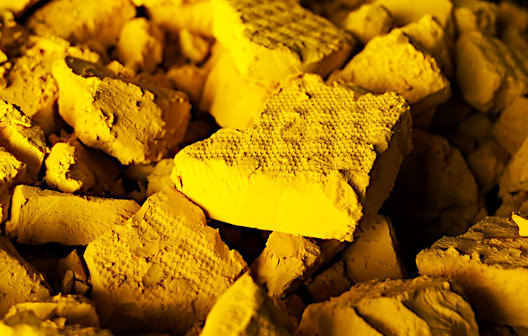
Slower Output and Increasing Demand Make Uranium Investments Hot
Uranium, the heaviest naturally occurring element on Earth, is an abundant source of concentrated energy. Unlike fossil fuels which require oxygen during burning to release heat, uranium atoms can be made to split or fission to release heat energy. And it’s potent. A thimble-sized pellet is equivalent to one ton of coal or 17,000 cubic feet of natural gas. This highly valuable – and at times controversial – commodity has been one of the hottest investments of 2021. Let’s explore why.
Uranium Consumption
About 10% of the world’s electricity is generated from uranium at nuclear reactors. It’s currently used in over 440 reactors in 30 countries with a total output capacity of about 390,000 megawatts (MWe). About 50 more reactors are under construction and over 100 are planned.
The mined metal is being used commercially for products as diverse as medicines and medical procedures, to growing and preserving foods, to industrial technologies that are considered safer and more efficient with the use of nuclear technology.
Reputation
The “darker” side of the commodity is the weapon technology that allows sudden unleashing of its harnessed power in a deadly way. Also, memories of Fukushima and Chernobyl invite some degree of skepticism when it comes to investing in uranium. However, it serves as a comfort to know that uranium is only sold to countries that are signatories of the Nuclear Non-Proliferation Treaty (NPT) and allows international inspection to verify that it is used only for peaceful purposes. When talking about nuclear energy, the two nuclear reactor leaks and weapons are usually the first thing to come to mind. But most do also realize the extent to which these energy sources have changed our lives over the last few decades.
Increasing Demand
Demand for nuclear energy has remained strong in recent years and is growing. The growth is projected to continue as a global shift to decarbonize aims to reduce industry dependence on fossil fuels. Meanwhile, the recent closure of 2 of the largest uranium mines in the world led to sharp price hikes for the metal. Even before the closure of these two mines in Niger and Australia, 2021 began with a record supply deficit.
Uranium deposit finds in North America are beginning to satisfy the deficit. The US is currently the world’s largest producer of nuclear power, accounting for more than 30% of worldwide nuclear generation of electricity. Current political discussions are beginning to categorize nuclear energy as an ESG-friendly source as transportation and infrastructure become increasingly electric. The US, Russia, Japan, and others are now looking to leverage their existing nuclear power capacity. Each of them faces little geopolitical barriers in doing so and is continuing to negotiate their plans.
Take-Away
The last few months have been rewarding for uranium investors with substantial appreciation to relevant companies’ shares across the sector.
As regions are recovering economically from the pandemic with a renewed interest in cleaner energy and infrastructure development, experts predict that uranium supply will go through more shortages as restocking cycles will struggle to keep up with utilization rates. At the current state, many investors are optimistic about uranium-related stocks and equities as they remain relatively cheap with prospects of compelling appreciation.
About the Author:
Laila Jiwani is a freelance writer specializing in topics related to social finance and international economic trends. Currently based in Dallas, Texas, she is an Erasmus Mundus Joint Master’s Graduate and has worked for economic development organizations in the U.S., Morocco, Kenya, Pakistan and Kyrgyzstan.
Suggested Content:

|

|
One-on-One with Energy Fuels
|
One-on-One with enCore Energy
|

|

|
ESG, B Corps, and Investors
|
Can Mining be Green and Sustainable
|

|

|
Issues Driving ESG Investing
|
How Does Uranium Fit Into the ESG Landscape?
|
Sources:
https://www.oecd-nea.org/jcms/pl_52718/uranium-2020-resources-production-and-demand?details=true https://ans.org/pi/usafestival/docs/Table4_V3.pdf
Stay up to date. Follow us:
 |
 |
 |
 |
 |
 |
Stay up to date. Follow us:
 |
 |
 |
 |
 |
 |

